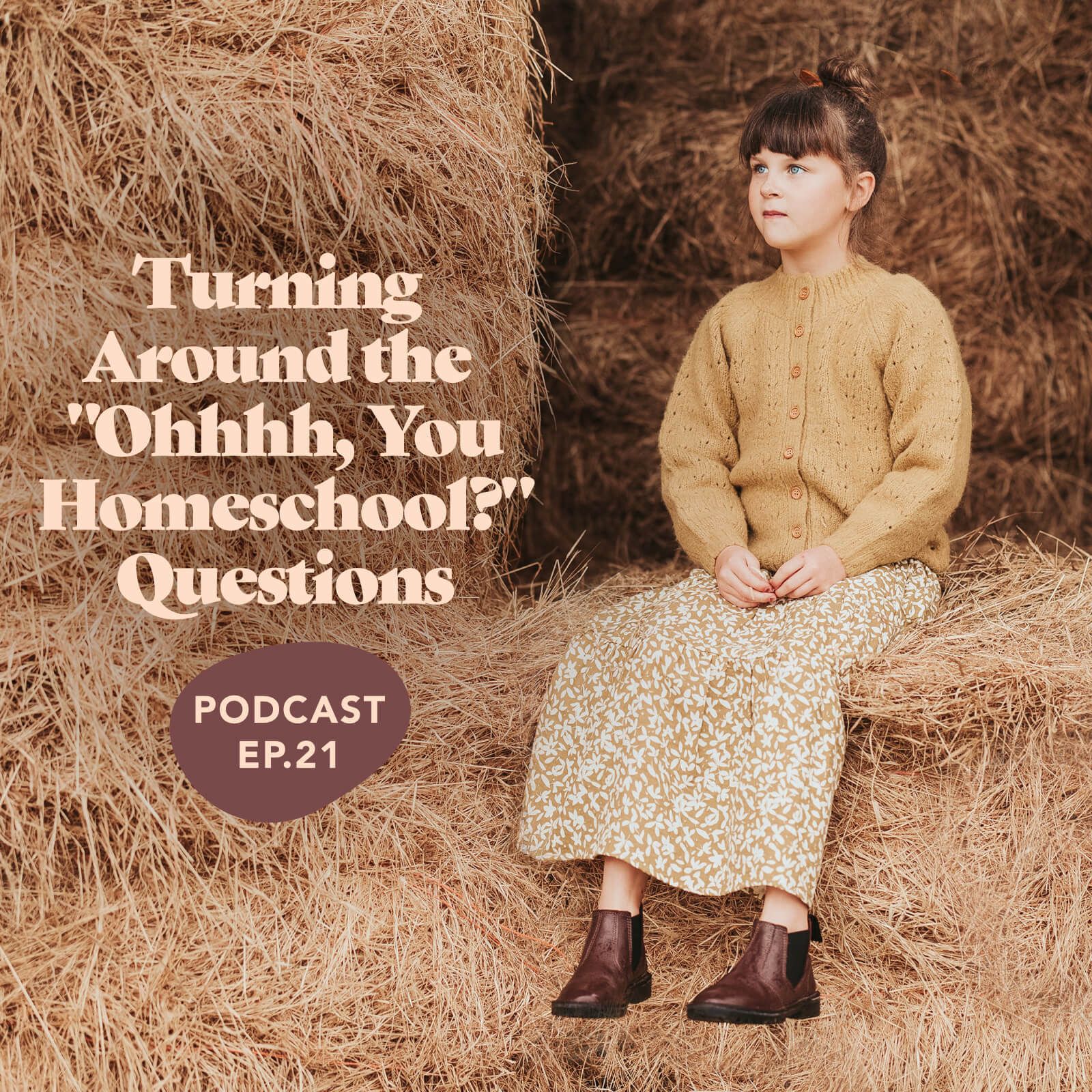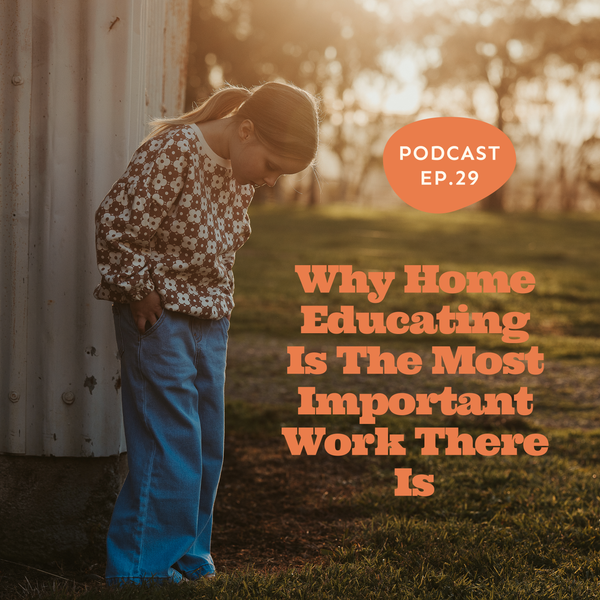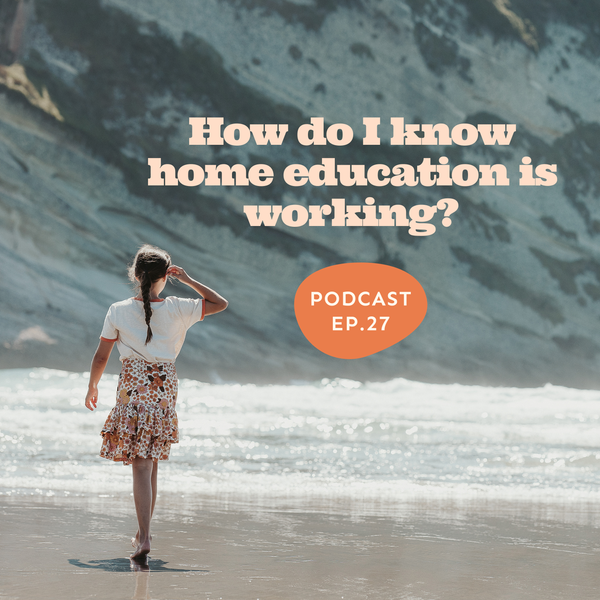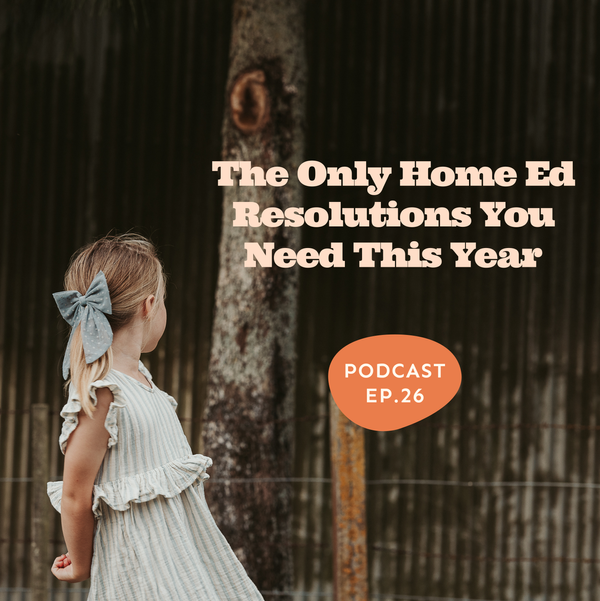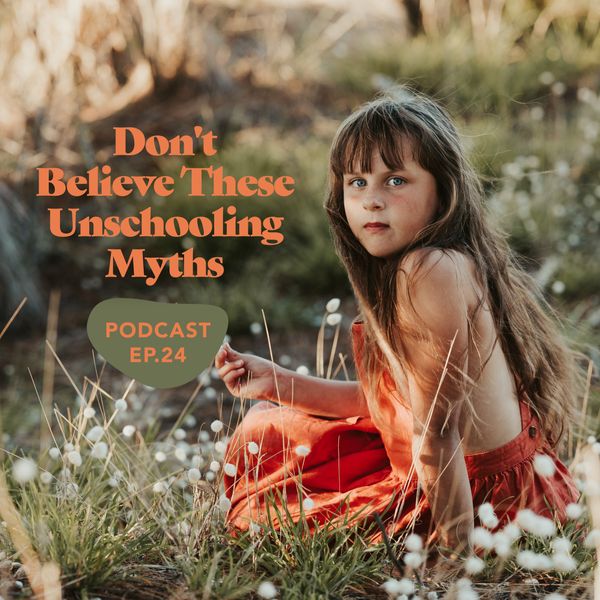In this episode I’m going to do something that might feel a bit uncomfortable. But if we want to move education forward in any real meaningful way, the kind of thinking I’m about to take you through is incredibly important.
I’m going to take some of the main questions that home educators are traditionally asked – some of the main worries people express when they hear you’re a home educating family – and then I’m very simply going to turn them around.
I’m going to ask them of the formal education system that’s currently in place almost globally. And I’m going to put some pressure on that system to give us honest answers to those questions.
I think you’ll find this conversation, and the questions it asks, both interesting and challenging – whether you’re home educating or not!
These private episodes go even deeper, backed by research, the science of how children learn and grow, and more than a decade of lived home educating experience. Each one is designed to help you rethink, reframe, and recalibrate the way you're walking this path, giving you the confidence to live the version of life you want. The Collection is 23 episodes strong and counting, with over 10 hours of listening available right now.
As a subscriber, you'll also get immediate access to my self-paced course, expert-led masterclasses recordings, five downloadable guides, our school exemption documents, and more 💛
Show Notes
Complete Transcript
INTRO
Helloooo and welcome to the Life Without School podcast, here to help you and your children live the life you want to, not just the one you’re told you should.
I’m Issy, a writer and home educating dad from New Zealand.
You can find my work at starkravingdadblog.com – all of my posts, podcast episodes, and short films created to encourage, support and reassure anyone walking this road less travelled.
Thank you so much for tuning in to listen today. Alright, let’s get into this week’s episode.
/INTRO
Hello, it’s nice to have you here with me today. If you’ve listened in before – hello again. And if this is the first time you’ve ever tuned in – welcome.
Today I want to do something that might feel a bit uncomfortable, but if we want to move education forward in any real meaningful way, the kind of thinking I’m about to take you through is incredibly important. And I think you’ll find this conversation, and the questions it asks, both interesting and challenging, whether you’re home educating or not.
Here’s what I’m going to do today:
I’m going to take some of the main questions that home educators are traditionally asked…some of the main worries people express when they hear you’re a home educating family…and then I’m very simply going to turn them around.
I’m going to ask them of the formal education system that’s currently in place almost globally. And I’m going to put some pressure on that system to give us honest answers to those questions.
I actually think this is something more and more parents have started to do, even if it’s just been subconsciously. You can’t be objective if you’re too close to something, or your life is too deeply embedded in it. You can’t critically analyse both paths at a junction if you’ve already started walking left and you’re just trying to look back at the other one over your shoulder. But over the past couple of years, a lot of parents have had the chance to come up for air. To step outside and then look back in at formal schooling properly for the first time in a long time, maybe even ever – because, we’ve never had the kind of disruption to the flow of education that we’ve being seeing, in lots of different ways, since early 2020.
It would be great if we’d all been able to ask these questions right from the start, before any of our children ever got close to school age, but how could we? That power of the status quo…the power of the social expectation to walk the school path or you will miss out on something vital…has been far too strong to allow most of us to do that.
But this is the moment, right now. This is the time when as many of us as possible should calmly, intelligently, and objectively take all those strongly held perceptions of home education – all those worries, and questions – and make sure we’re also asking them of formal education. Because only then can we make an objective, informed decision about the right path for our child. Only then can we start to see the change that’s needed, and to really lean in to being part of writing a new narrative.
Now, just to be really clear, I don’t want this conversation to come across as bashing schools.
The intentions of a great number of people within formal education are good, and genuine, and hopeful. Especially teachers – many of them, at least – who I believe are doing one of the hardest jobs on the planet in a system that just does not support them to do it with any real creative freedom. The system has problems, a lot of problems, but there are good people trying to do good things within it.
But what I do want to get across here – strongly – is that the critical lens that is so often put on someone’s decision to live a life without school, should be put on any decision relating to a child and their future. Yes, it is fair – and actually good – to ask the questions of home education that I’m going to go through here. But what we haven’t done enough of is asking those same things of the school system before we start dropping our children at the front gate.
Ok, so let’s talk through this series of questions that I – and most home educators, ever – have been asked before. And, I can promise you, I have been asked all of the questions I’ll talk through today many, many times. I’ve been asked them by family, and friends, and complete strangers. And most of that is ok – of course I have. Remember the strength of the status quo. It…chains us. And it chains our perspectives. The most important thing – and the goal of this episode – is to bring things back into the middle, so we can objectively look both ways.
I’ll read each question…but instead of answering it from the perspective of home education, I’ll ask it of formal education instead. And I’m going to put the same pressure on that system to defend itself that home educators often face.
Ok – let’s see if we can find some balance here.
MUSIC
Question one: How will your child develop social skills?
The assumption is that by attending school, and attending a classroom, children will automatically be given a path to becoming balanced, confident, well-socialised adults. And if they don’t have that experience, they won’t.
But let’s just make sure that idea actually stands up.
Let’s take a 10 year old child as an example here. When that child first enters their classroom to start the year, what does that environment look like from a social development perspective?
Well, we know it’s where they’ll spend a lot their time for at least the rest of the year. That’s their base now. We know that the main interactions they will have, day to day, will be with the same group of children who are also arriving at that classroom. We know they’ll interact with their teacher, and maybe other teachers here and there. And we know they’ll probably have access to areas like a playground, and a sports field, and other children of different ages during some break times.
On the surface, they’re going to have plenty of social interaction. Especially compared to a home educated child, who won’t be allowed inside those gates and so won’t have access to any of those people or spaces.
But we’re not here for that surface perception. We’re here to dig a little bit deeper.
So let’s look closer at the environment this child’s social interactions will play out within.
Every child in that classroom is also 10 years old. Or, close enough to it. And every child in that classroom is there because they have been told to be. Maybe, if we gave them all the option, some of them would stay – but most of them would not.
So we have a group of children who had no say in whether they want to be part of that specific group. We have a group of children who are all the same age, whether they actually like interacting with others of their own age or not – and I can promise you, plenty of children don’t.
We have a group of children who must gather and stay in that one room until they’re told they can take a short break, or – eventually – leave for the day.
And then standing at the front of the class, we have the only person who is a different age, and the only person who has actually chosen to be there – more or less – the teacher.
But that teacher doesn’t just get to work with these children however they want. They must follow the plan, and keep up with a very clear delivery and testing schedule. Their interactions with that group of children will mostly – by necessity – be through a lens of needing to develop them against a standard not even they themselves had any say in defining or setting.
Which means, they’re under pressure.
So let’s be clear – this is not a natural social environment. It actually couldn’t be further from it. It’s a constructed space, with rules and guidelines and expectations.
Now let’s exit the classroom for lunchtime. Aside from the fact this is where inequalities are exaggerated more than anywhere – you only need to glance around at children’s lunchboxes, and who is sitting with who, to start getting a sense of that – this is also where all that pressure from within the classroom releases.
It happens in all sorts of different ways – some children express it through running and shouting for 30 minutes straight, others express it through picking on someone they perceive as weaker (which often just means younger) to give them some sort of feeling of control. We could go on and on, here. The mix of stresses and feelings, and the social behaviours that come from those in a playground…we could spend and entire episode on that.
But let’s just say that a playground space in a school ground – while it looks like a fun, relaxed area, and sometimes is – is also something that acts like a pressure valve, one that is released in both positive and negative ways.
And if you’re on the receiving end of that negative type, you cannot choose to leave. And you’ll likely face it again tomorrow, and the next day, and the next.
And if you’re the type of child who feels that pressure building, and struggles to control how you release it, you’ll be on that daily rollercoaster for a long time.
So what do we think? Is school – just by default – really bringing every child that walks through the gate a balanced, varied social experience that sets them up for life?
Does most of a child’s time spent in one room, or small number of rooms, with mainly children of exactly the same age offer that?
Does having one or two adults present in the room, but who quite clearly exist as a superior to you, and who are quite clearly under pressure to get you to make progress and to keep you on task, really develop your ability to interact and communicate with all kinds of different people?
Does spending time in a playground, or on a sports field, or in a lunch area, or in big hallways, when you have no choice to leave if things get uncomfortable, or scary, make you a more balanced, social person?
And does being put through all of this with little to no input from the child, really allow them to build confidence within themselves as they relate to other people on their own terms?
So let’s ask the question again: if a child attends school, how are we going to make sure they develop socially – positively – in that kind of environment?
SHORT MUSIC
Question two: How will you make sure your child is actually learning, and keeping up?
Let’s go back to the classroom we were visualising in the last question. Let’s say it’s a room with 25 children – there are classes that are smaller than that, but there are plenty of classrooms around the world with a lot more, so let’s pick a good middle number.
25 children, with one teacher looking out across them. One teacher, with one prescribed curriculum, and an expectation to deliver it on time, to the schedule, and with good results. That is literally what they are paid to do.
How are they going to manage that? 25 children, all with different backgrounds, and strengths, and things they find hard, and things they like and don’t like, and stresses, and distractions, and needs, and wants…
How is that teacher going to make sure that every one of those children keeps up with that schedule?
Well, we can benchmark them. We can test them. And we can grade them. Because that will do two things – it will tell us whether or not they’re keeping up, and it will remind them to focus so that they make sure they do. If there is a test at the end of the term, the children will not want to fail it. They will work hard to make sure they don’t. Pressure. Expectation. Results.
But this is going to be a pretty short part of the conversation, because having so many years of test data behind us tells us something very clear – this approach to ensuring learning, and keeping up, doesn’t work well for a lot of children. And for a child who doesn’t naturally learn in the way we ask them to in a classroom, it actually makes things much worse.
This is not something to debate. It’s just a plain fact that’s represented in the data from almost every school, every year.
So we just have to accept that, despite that teacher’s best efforts, despite the very clear expectations we set for them, some of those 25 children are going to fall behind. Some will be ahead, and want to get further ahead, but won’t really be able to. And then a group in the middle will roll along doing ok.
But if you walk into a school, almost any school, and gather all the children who are falling behind where the system says they should be…you would have a pretty big group of kids. And there’s really not much we can do for them, because we don’t have the resources. We don’t have the time. So there’ll be some remedial classes over here, and some notes to the parents over there, and a report card that re-states those expectations over here…but really, none of it will make much difference.
All it does is lead us to the elephant in the room: that we’re applying one standard, one schedule, one type of learning experience, to 25 different children. All unique, all different, all special in their own way. But when they can’t keep up, the message is…you’re not special. You might be different, but that’s not good. You’re not living up to our expectations. You’re failing us. And you’re failing yourself.
So my question is – does the importance of keeping up outweigh the mental impact of that message?
Are we really sure we agree that the benchmarks and standards and subjects are actually as universally important and necessary as we treat them?
Are we really sure childhood has to be all about meeting learning goals, and keeping pace, at the cost of almost everything else?
Let me ask the question again: if a child attends school, how are we going to make sure – really make sure – they won’t be one of the many who falls behind?
SHORT MUSIC
Question three: Are you worried your child won’t be prepared for the real world?
Of all the questions we should be asking ourselves, as parents, this is one of the most interesting. So I completely understand why, as a home educating dad, I would be asked it. And, I expect myself to have a pretty good understanding of what my answer is.
But there are two things that need to be said here.
The first is the surprising assumption that going to school just solves this. To such an extent that we don’t really even need to ask the question.
And the second is that the framing of this question tells me that our entire education system is thinking about life, and childhood, in what I believe is the wrong way. It tells me that childhood is seen as a preparation phase of life. As a time to prepare for the life you might live as an adult.
But when you really think about it, that’s kind of crazy. We’re taking 13 years, or more, of a child’s formative years and saying: ok, lean in, because there’s a lot to prepare for. There’s a lot you need to know, and understand, and be able to do, before you can head out into the real world and live your life.
Would it not be better to see life as something you’re living, and growing in, from the moment you’re born?
Do we really need to spend 13 long years formally preparing for it? Isn’t the very idea of that just creating a paradigm of preparation that doesn’t actually need to exist?
The irony, which pours from the framing of this question, is that by asking children to live in that state of preparation we’re actually removing them from many aspects of real life. We are taking away the opportunity to experience things live, as they happen, throughout childhood…and to grow organically. To be…in the now. We’re not quite putting their lives on pause, but to some extent we are. We’re asking them to focus on a very specific set of subjects, and topics, and skills, and ways of thinking. And by doing that, we’re defining a version of the ‘real world’ for them – one that is quite compliant, one where things like autonomy, and personal meaning, and mastery don’t really belong.
Remember, there are many versions of the ‘real world’. There is not just one. But when you dig into this question, a lot of the worry seems to be about how a person will handle compliance as an adult if they haven’t learnt that as a child. And that leads to one of the most common versions of the real world:
One where many people (if you look at the statistics, it’s often close to three quarters) are unhappy with what they spend their working days on, yet feel almost powerless to change.
One where people endlessly chase the money they need to offset the dissatisfaction they feel while actually earning it.
One where values like meaning, purpose, balance, autonomy and happiness are scoffed at as idealistic.
One where things like conflict and stress exist almost daily and are seen as things we need to ‘harden up’ to.
One where you will regularly be told ‘no, that’s just the way it is’ if you question it.
So I’ll ask the question, again: if a child attends school, and we relentlessly ask for compliance on things they do not respect, or have an interest in, have we really considered the version of the world they’ll spend all those years preparing for?
And…aren’t we a bit worried about that?
SHORT MUSIC
Question four: Will you let your children go to school if they ask to?
I was asked this question again recently. I was talking to another parent at the library, and because it was during school hours and we were there with our children they were asking if they were sick, or having a mental health day, or…which of course led me to saying that we home educate, and so they don’t go to school at all.
And, through that short conversation – this question came up. If they asked to go to school, would we let them?
I believe it comes from a good place. It comes from that inner parent voice of responsibility and sensibility: if our children don’t actually want to walk this path that we’ve chosen for them, then surely we need to listen, and discuss, and talk about the pros and cons, and potentially make a change.
Well…I completely agree. That’s absolutely how we should navigate childhood. We should – us, and our children – always be trying to make the most informed decisions we can.
But how many of us, as parents with children at school, have listened, and discussed, and researched, and talked about the pros and cons.., and then, if our children aren’t thriving there, made a change.
How many of us have said to our children, before each school year starts: “Hey, remember, you don’t have to go to school any more if it’s not right for you – you can choose to stay home if that’s a better fit.”
Well, statistically, not all that many of us. It’s a growing number, of course – I talked in an episode recently about the rapid growth in families making the decision to live life outside of school – but we’re still a significant minority.
Is that because most children actually want to go to school? Or is it because most children are never asked.
So, let’s ask this final question one more time: if a child is going to school, and decides it’s not right for them, will we sit down and hear them out? Will we help them make a change?
CLOSING MUSIC
Four questions that home educators are often asked, and expected to have good, solid answers to. Questions that should be asked, and researched, and reflected on.
But four questions that, when turned around, start to become quite difficult to answer in purely positive ways.
I said right at the start of this episode that I don’t want any of this to come across as school bashing. That’s not what we’re here for, because that doesn’t get us – and future generations of children – anywhere. So I hope you don’t feel that’s happened today.
What I hope I’ve been able to do here is bring objectivity to an area of life that isn’t often looked at this way. I hope I’ve brought some balanced perspective to the way our views on formal education slip into defaults.
I hope I’ve challenged the status quo in a thoughtful, considered way. Because our children’s lives should not be left to assumptions. They should not be left to ageing perceptions that are never challenged.
There are many possible paths through life. There is no one right way. But there will be paths your child finds difficult to navigate. And there will be others that suit them better.
As parents, it’s our job to be their guide. To help them at those junctions. To ask the right questions, of the paths ahead…and of them…and of ourselves.
To do our best, always, with what we have in front of us.
Ok, that’s it for today.
Thanks for listening in, and I’ll see you back here soon.
Bye for now.


